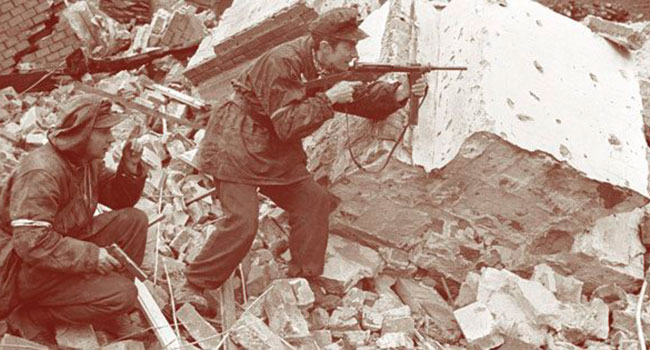 Canadians who grouse about living next door to the American elephant should consider the situation of Poland, particularly in the mid-20th century.
Canadians who grouse about living next door to the American elephant should consider the situation of Poland, particularly in the mid-20th century.
With Josef Stalin’s Soviet Union on one side and Adolf Hitler’s Germany on the other, Poles must have occasionally wondered just what they had done to merit this unfortunate geography.
English journalist Max Hastings put his finger on it. Referring to the Polish experience in the Second World War, Hastings succinctly noted that “The Poles ended the war as they began it, human sacrifices to the reality of power.”
Polish military resistance to the September 1939 onslaughts from both Germany and the Soviet Union was spirited but futile. In little more than a month, the formal campaign was over.
However, that wasn’t the end of it. Poland didn’t officially surrender and a Polish government-in-exile was formed. Located first in France and subsequently in London, it was widely recognized as the legitimate government of Poland until the summer of 1945.
Even more important, the Poles made a substantial contribution to the Allied war effort right up to VE Day. Indeed, thanks to the tens of thousands of military personnel who’d escaped, it’s estimated that they were the fourth largest manpower contributor in the European theatre.
Lynne Olson’s recent book Last Hope Island devotes a chapter to one of the critical Polish contributions. During the dark days of the Battle of Britain, Polish flyers were close to indispensable.
Olson paints a daunting portrait of the Royal Air Force’s predicament in the summer of 1940. Fighter Command had lost almost one-third of its pilots during the fiasco in France, and Commonwealth countries like Canada, Australia and New Zealand couldn’t fill the entire gap. So in desperation – and very much against its will – it turned to “foreign” pilots, defined as men who’d escaped to Britain after the fall of their own countries.
Of these, Poles and Czechs were the most numerous. But the RAF initially wanted nothing to do with them. They were not, it was believed, up to the mark. Olson puts it this way: “While the Poles were distrusted because of their defeat, the Czechs were scorned because they hadn’t defended their country at all when the Germans had occupied it.”
Necessity, though, can have a very sobering effect. As pilot losses mounted, the RAF’s position softened, first permitting the formation of all-Polish and all-Czech squadrons and then authorizing their deployment. On Aug. 31, 1940, the Polish 303 Squadron went into battle.
It was effective from the get-go, accounting for 15 per cent of the RAF’s German kills on that first day. Five days later, its contribution was 20 per cent. And over its first six weeks in combat, 303’s kill rate more than doubled that of any other squadron.
Olson identifies two reasons for the relative proficiency of 303’s flyers.
One was age and background. With prior combat experience and “hundreds of hours of flying time in a variety of aircraft,” they were more adaptable than their younger British counterparts.
The other reason came down to attitude. The Poles were simply more aggressive.
And the Polish contribution went way beyond the Battle of Britain. Fighting as part of the British Eighth Army, the Polish II Corps served with special distinction in Italy, playing a key role – and incurring heavy casualties – in the 1944 Battle of Monte Cassino. At its peak, there were more than 100,000 soldiers in its ranks.
There was also the matter of the early Polish contribution to decrypting Enigma, the German cipher machine. Belatedly, it’s been recognized that this “greatly assisted the Bletchley Park code breakers and contributed to the Allied victory in World War II.”
Then came the Yalta Conference.
Meeting with Stalin in February 1945, U.S. President Franklin D. Roosevelt and British Prime Minister Winston Churchill effectively ceded Eastern Europe, including Poland, to the Soviet Union.
While Roosevelt wasn’t particularly concerned about Poland’s fate, Churchill was at least somewhat troubled. But it didn’t matter. Stalin was in situ and could only have been evicted by force. And an exhausted Britain was essentially clapped-out as a world power.
Yalta is often described as a betrayal but it’s more realistically seen as a recognition of reality. Nobody was going to fight the Soviets over Poland.
For countries as well as individuals, it helps to be lucky in your choice of neighbourhood. Poland wasn’t lucky.
Troy Media columnist Pat Murphy casts a history buff’s eye at the goings-on in our world. Never cynical – well perhaps a little bit.
The views, opinions and positions expressed by columnists and contributors are the author’s alone. They do not inherently or expressly reflect the views, opinions and/or positions of our publication.

